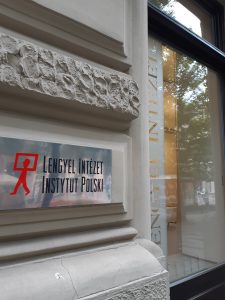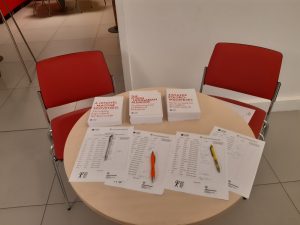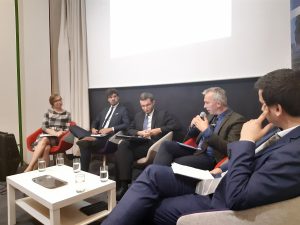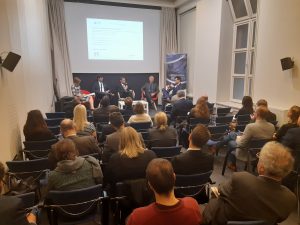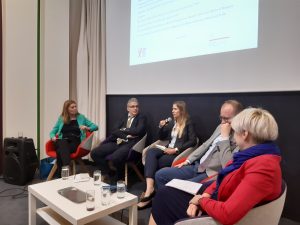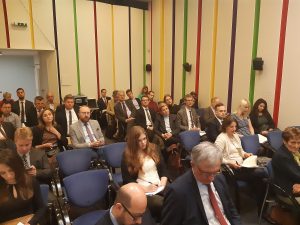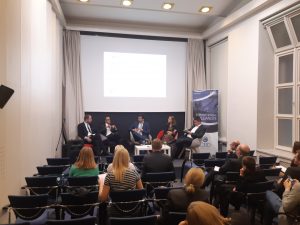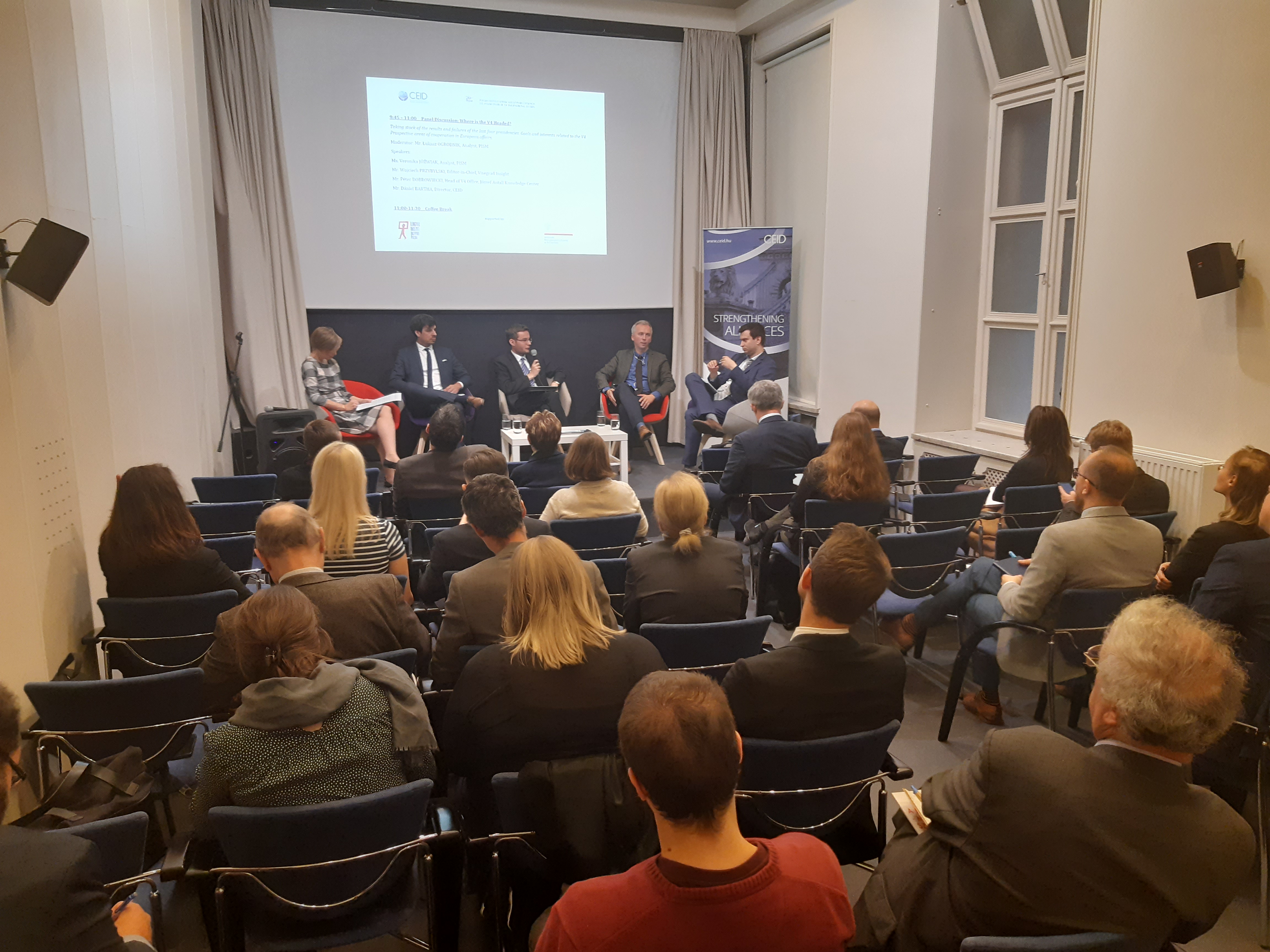
30 Sep Dwa Bratanki 2019: In Search of Poland’s and Hungary’s Common Foreign Policy Goals
CEID had the pleasure to host the fifth edition of the Dwa Bratanki conference with the Polish Institute for International Affairs (PISM) at the Polish Institute Budapest on the 26th of September. The event covered the most important areas of foreign policy from the Polish and Hungarian perspectives with special focus on the accomplishments of the V4, the integration process of and situation in the Western Balkans, as well as the outlooks for the new EU institutional cycle.
The conference was opened by the welcome speeches of H. E. Mr. Jerzy Snopek, Ambassador of the Republic of Poland in Hungary, and Mr. Zsolt Németh, Chair of the Foreign Affairs Committee of the Hungarian Parliament.
Regional cooperation: where is the V4 headed?
The first panel aimed to take stock of the results and the failures of the last four presidencies and shed a light on what the future directions might be for the Visegrad group with Veronika Jozwiak, senior analyst of PISM, Dániel Bartha, director of CEID, Péter Dobrowiecki, head of EU-V4 Office of the József Antall Knowledge Centre and Wojciech Prybylszki, editor-in-chief of Visegrad Insight, moderated by Lukasz Ogrodnik, senior analyst of PISM. The case-by-case sectoral policy cooperation nature of the countries was greatly emphasized when discussing the successes, and according to the panelists, this has to remain the modus vivendi and the soul of the whole initiative, regardless of what the possible changes in politics might bring about.
Mr. Ambassador Snopek underlined in his openinc speech the importance of the horizontal cooperation between the different regional formats and how more should be done in this field by the think tanks, and this was also mentioned by the panelists when the issue of infrastructure was debated. Everyone agreed that the V4 is behind schedule in this aspect, and this notion was a reccurring one throughout the whole conference.
Concerning vision for the EU, Veronika Jozwiak said that “the four countries don’t go into details [when they are discussing it together], because it would immediately turn out that there are huge differences between them”. She added that the V4 should open up more instead of looking at itself all the time, there are more partners regarding EU affairs whom we should cooperate with more.
According to Dániel Bartha, “the key question as a grouping is the relations with Germany for the future. [..] perspectives of our future are very much linked with Germany’s perspectives [..] and we will follow suit within the EU”. As for the enlargement of the EU towards the Western Balkans, he believes that Commissioner-designate Trócsányi is a strong indication that there is no enlargement in sight.
Western Balkans – the future of enlargement?
Naturally, the theme of this panel was quite a relevant one for the Central Europe, as László Trócsányi had been designated to be the next commissioner for enlargement and neighbourhood policy. Edit Inotai, senior fellow of CEID, started off the discussion by asking the panel members to rate these news, whether it is good news and whether it would boost the Western Balkans countries’ chances of accession.
András Klein, head of the Western Balkans Department of the Hungarian Ministry for Foreign Affairs and Trade, said that if the commissioner is coming from a diplomacy that is like-minded and supportive of the idea of accession, that is indeed good news. He underlined the importance of the Council though, as this process will mainly depend on this body regardless how supportive the Commission might be.
Anna Orosz, senior research fellow of the Institute for Foreign Affairs and Trade, said that it’s definitely good news for the process itself to have a supportive commissioner, and it’s very important to have will and actors within the EU who are actually active in this issue.
Tomasz Zornaczuk, head of the Central Europe Programme of PISM, highlighted the fact that enlargement is such an important issue, it is not a controversial policy in Poland as the whole society is also supportive of the initiative. What is more, beside the political-economic interests, there is an element of morality in it, as well, as the underlying will is simple: to unite Europe in peace and prosperity. This was the case during the 2004 enlargement, too, it was a question of ethics, morality – however, he was not sure that the Western Balkans leaders see it this way in 2019, as well.
Marta Szpala, senior research fellow of OSW (Centre for Eastern Studies, Poland) sees it that the whole question has already been agreed on in Poland, it is now time to speak about the concrete steps, the strategy itself out of economic, strategic and geopolitical security motivations and interests. She was critical of the region, however, as there are “many problems, […] data suggests that the institutions weakened, the levels of rule of law deteriorated”.
As for what the real interests and motivations of Poland and Hungary are behind the accession of the Western Balkans countries, the experts have differing views based on their respective countries. For Hungary, it is apparent that the economic and security reasons are the most important driving factors, 20% of the Hungarian trade surplus came from the region last year and the economic ties with Serbia alone estimate to 2 billion euros. The security interest is very strong, as whatever happens in Hungary’s direct neighborhood has an immediate impact here, while there is the consideration of Hungarian minority groups in Serbia, for instance. As for the Polish side, the economic considerations are much weaker, as the trade exchange is about 1% the best with Croatia within the whole of Polish trade, for instance. What is much stronger is the societal and more softer ones like tourism and culture, for example. The other factor that has always been very strong from the Polish side is military and police presence in the region.
Also, all of the panelists agreed that the V4 is a competent actor when it comes to giving advice to the Western Balkans countries on the accession. There are Hungarian integration experts in every Western Balkan capital city with expertise from the Hungarian accession process working with the respective ministries. Poland organizes an annual conference with Serbia, North-Macedonia and Albania on a ministry-level, while the reconciliation program carried out with Germany can be an example for the countries of the region. There is also an increasing will to cooperate between think tanks interregionally driven by the Think Visegrad Network, while the frameworks of the Berlin process enable the cooperation of local governments and the know-how needed to better use funds.
When it comes to security and geopolitics in the region, energy and the issue of NATO is of importance. According to Attila Klein, the V4 is not the only political supporter within the EU as there are just three countries that are not open: Denmark, France and the Netherlands. NATO’s role is crucial in the region, as steps for further integration are generally more logical to take inside the organizaton. Montenegro’s accession was not an easy task, but the alliance’s presence is crucial to counterbalance Russian and Chinese advances – and that is the reason the EU should step up more, as well.
The EU under the new institutional cycle from Polish and Hungarian perspectives
This panel discussion started off by recent developments as the Legal Committee of the European Parliament did not find Commissioner-designate Trócsányi suitable for his role of Commissioner for Enlargement and European Neighbourhood. This came quite a shock for the panelists – though not as a complete one – and especially for Viktor Kecskés, head of the department at the State Secretariat for EU Affairs of the Hungarian Ministry of Justice. The rest of the panel featured Jolanta Szymanska, head of the EU programme of PISM, Michal Mazur, deputy director of the European Policy Department of the Polish Ministry of Foreign Affaris and Sándor Gyula Nagy, deputy director of the Hungarian Institute for Foreign Affairs and Trade and the moderator was Dániel Bartha, director of CEID.
The issues that came up in this panel were not surprizingly new: the MFF-negotiations and what the most important positions of the two governments are, the ongoing rule of law procedures, Brexit, migration and the Common Security and Defense Policy. A trend that is characteristic of Central Europe is migration staying on the top of the agenda and not being replaced by climate – this is clearly the other way around in Western Europe, as can be seen from the results of the EP elections in May.
The positions of the two countries are very similar and traditional in the MFF-negotiations: for Hungary, the enlargement and neighborhood, agriculture and cohesion, the cuts of the budget itself and the possible rule of law conditionalities. Research, development and innovation has to be top, according to Sándor Nagy, because the value added of the regional national companies is very low, SMEs won’t survive without innovation, either. As for the euro, he believes the moment when the Hungarian government might consider joining the eurozone can come in the next five years. Viktor Kecskés added that the EU has already existing mechanisms that control spending, these existing ones should be reinforced and not new ones created.
Jolanta Szymanszka said that there is a strong support from the Polish government to invest in high technologies, while demography might also show up in the institutional debate, because the demographic challenge is already so huge “it might affect voting in the council in the future”. Cohesion is essential from the Polish side, as well, as there are still huge differences between member states.
Answering to the question whether there should be further institutionalization and new treaties in the EU, Michal Mazur stated that such a thing would be foolish right now, as no one in the EU has a clear vision on which direction it should be changed. Ursula von der Leyen initiated a 2-year-long conference on this topic, that is as close we can come to such a thing. Ms. Szymanszka added to this that perhaps it might be more transparent to change the treaty to have a clear common basis for the EU having in mind all the recent developments, such as the definition of rule of law, but there is just no chance for that at the moment.
For additional summaries and texts about the event in Polish, visit the Sejm‘s or niezalezna‘s website.


